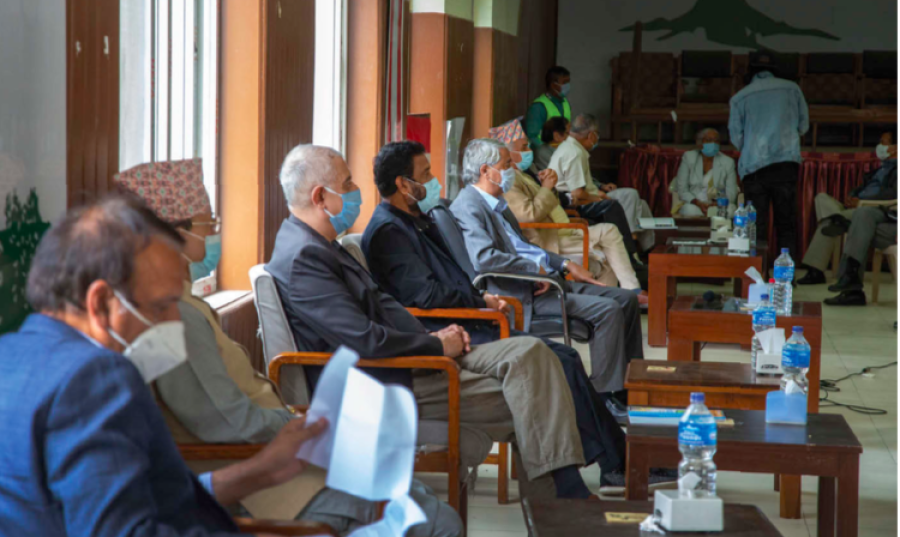Politics
Nepali Congress registers its own constitution amendment bill
The bill is the same one that was registered by then government led by party President Deuba in 2017.
Anil Giri
The Nepali Congress on Tuesday registered a constitution amendment bill of its own, the same one registered three years ago by the government led by party President Sher Bahadur Deuba.
The primary opposition registered the bill as per Saturday’s decision of its Central Working Committee, a day after two Madhes-based parties registered a joint private bill, seeking constitutional amendments.
Eight lawmakers representing Madhes constituencies from the Congress, which has already backed a government-sponsored bill to amend the constitution to update the national emblem in accordance with the new political map, registered the bill at the parliament secretariat on Tuesday.
“This bill we have registered is a private bill, and it should receive support from the government,” said Nepali Congress lawmaker Amresh Kumar Singh, who registered the bill.
The bill, which had been shot down in July 2017 due to opposition from the then CPN-UML led by KP Sharma Oli, seeks to include all languages spoken in Nepal in the schedule of the constitution, accord equal citizenship rights to foreign women married to Nepali men and delineate electoral constituencies on the basis of population.
Likewise, the bill also seeks proportional representation in major appointments in state entities, including ambassadorial postings, and amending the electoral process for the National Assembly on the basis of population—the demands raised by Madhesi parties.
The Samajbadi Party Nepal and Rastriya Janata Party Nepal, the two parties with their vote base in Madhes, have long been demanding that the constitution be amended to address their demands related to citizenship and demarcation of provincial boundaries.
“The objective behind registering the bill is to amend the constitution to incorporate the long-standing demands of Madhes-based parties,” said Singh.
“Why can’t Prime Minister Oli or the Nepal Communist Party chair Pushpa Kamal Dahal support our bill?” he said. “In a functioning democracy and a parliamentary system, governments do support private bills. So we also expect the same with the Oli government.”
Congress lawmakers filed the bill after over a dozen Central Working Committee leaders, speaking at a meeting on Saturday, asked the leadership to revive the 2017 proposal. They had said that the party should also file a separate bill of its own, if it is to support the government-sponsored constitution amendment bill to make changes to the country’s map to include territories also claimed by India.
“There is no relation between the bill registered by the government to get the new map approved and the bill we registered,” said Singh.
The party has already decided to support the government bill to change the national emblem in accordance with the new political map that includes the territories of Limpiyadhura, Kalapani and Lipulekh.
Though Congress leaders including Singh have claimed that the bill will get support from the ruling party and others in the opposition, including the Madhes-based parties, Madhesi leaders doubt that the bill is intended to serve any other purpose than to woo the Madhesi constituency.
Rajendra Mahato, a member of the six-member presidium of the Rastriya Janata Party Nepal, told the Post that the Congress’ move to register the bill is just political hogwash.
“Is the Nepali Congress really serious?” said Mahato. “I only see it as a consolation, nothing more than that.”
The Nepali Congress, Rastriya Janata Party and Samajbadi Party had recently agreed to jointly register a constitution amendment bill to address the demands of the Madhesi people, but they failed to do so. The two parties filed their own bill on Monday, a day after the government presented the bill to amend Schedule 3 of the constitution to update the map in the national emblem.
“We know that the ruling party is not going to support our bill,” said Mahato. “But if the Nepali Congress decides to support our bill, we will also support theirs. But no discussion has taken place yet to that effect.”
Even if the two parties decide to support each other’s bills, they can’t sail through Parliament without the ruling party’s support, as the three opposition parties lack the numbers in both th.




 14.24°C Kathmandu
14.24°C Kathmandu














